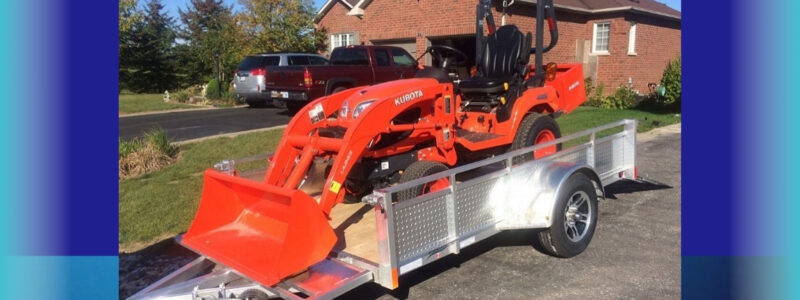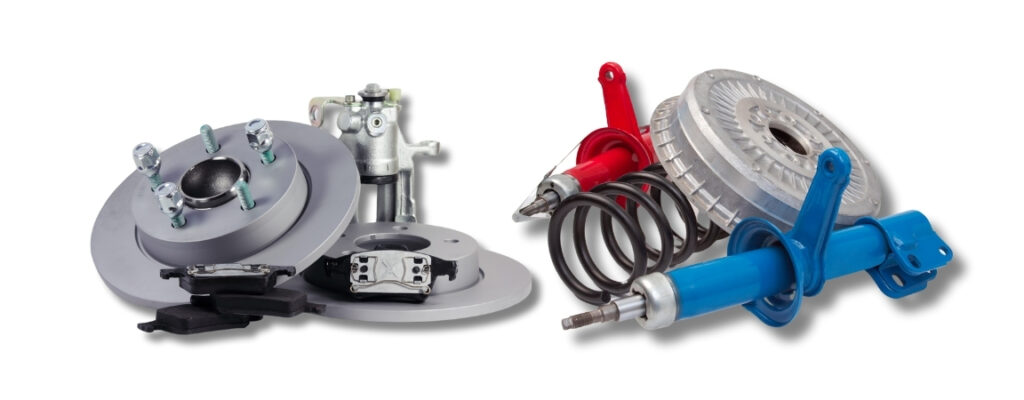
June 15, 2024 Last updated on June 16, 2023 by Bob Fisher Bob Fisher Utility Trailers
Maintaining a utility trailer for long-term use is crucial for ensuring its reliability, safety, and longevity. A well-maintained trailer not only performs better but also helps in avoiding unexpected breakdowns and costly repairs. Regular maintenance checks and timely interventions can significantly extend the life of the trailer, providing better value and peace of mind for its owner. This initial investment of time and effort into maintenance pays off by ensuring that it remains in optimal condition and ready to meet various transport needs effectively.
Proper utility trailer maintenance involves several key aspects, including checking the tires, inspecting the brakes, and ensuring the integrity of the frame and hitch. Tires should be regularly inspected for wear and tear, and air pressure should be maintained at recommended levels to avoid blowouts. The braking system, crucial for both safety and functionality, must be routinely checked and serviced to prevent any failures. Additionally, the frame and hitch components should be examined for any signs of rust, corrosion, or damage that could compromise structural integrity.
Consistent care and attention to these details contribute to a safer, more efficient use, ultimately protecting the investment. By adhering to a regular maintenance schedule, Millroad trailer owners can ensure that their utility trailer remains a dependable tool for years to come.
Cleaning and lubrication are fundamental aspects of maintaining any trailer. Properly cleaning and lubricating all moving parts, including wheels, hitch, and door hinges, ensures smooth operation and extends the lifespan of these components. Dirt, grime, and rust can accumulate over time, causing unnecessary wear and tear if left unchecked. Regular cleaning helps remove these contaminants, preventing potential damage and preserving the integrity of the mechanical parts.
Lubrication, on the other hand, reduces friction and wear on moving parts, allowing them to function effectively without undue stress. Applying the appropriate lubricants to the wheels ensures they rotate freely, which is critical for both performance and safety. Similarly, keeping the hitch well-lubricated facilitates secure and easy attachment and detachment, minimizing the risk of accidents or malfunctions.
Door hinges, often overlooked, benefit immensely from regular lubrication. Well-lubricated hinges prevent squeaking and ease the opening and closing of doors, which is essential for both convenience and operational efficiency. By integrating these steps into your regular maintenance routine, you safeguard the functionality and durability of each component, ensuring your equipment remains reliable and efficient over time. Maintaining a focus on these cleaning and lubrication practices will provide long-term benefits, ultimately protecting your investment and ensuring optimal performance.
Regularly checking tire pressure and replacing worn tires are critical components of utility trailer maintenance, significantly impacting both safety and performance. Tire pressure should be monitored constantly to ensure it remains at the manufacturer-recommended levels. Under-inflated tires can lead to increased tire wear, reduced fuel efficiency, and a higher risk of blowouts, which can pose serious safety hazards, especially when hauling heavy loads. Conversely, over-inflated tires can reduce traction, leading to compromised handling and stability.
Replacing worn tires is equally important to maintain operational integrity. Tires with insufficient tread depth can severely reduce traction, especially in adverse weather conditions, increasing the likelihood of skidding or accidents. Regular inspection for signs of wear, such as balding, cracks, or bulges, will help identify when it’s time for replacements. This proactive approach in utility trailer maintenance not only ensures it remains safe to operate but also optimizes its performance, allowing for smoother and more efficient transport.
By prioritizing tire maintenance, you contribute to the overall reliability of the trailer. This diligence in upkeep minimizes the chances of unexpected breakdowns, extends the tire’s lifespan, and ensures it can perform its tasks effectively, safeguarding both the trailer and its load.

Regular brake system inspections are vital to the safe and efficient operation of a utility trailer. As part of these inspections, it is critical to assess the brakes and replace brake pads when necessary. The braking system is one of the most crucial safety components, ensuring it can stop effectively, especially when carrying heavy loads. Neglecting brake maintenance can lead to brake failure, posing significant safety risks and potentially causing accidents.
Inspecting the brakes involves checking for any wear and tear on the brake pads, rotors, and other related components. Brake pads, in particular, are subject to high levels of friction and heat, leading to gradual degradation over time. Worn brake pads can reduce braking efficiency, increasing the stopping distance and compromising safety. Replacing brake pads when needed ensures the braking system remains effective and responsive.
Additionally, a well-maintained brake system enhances the overall performance and longevity of the trailer. For those wondering what is a utility trailer, it is a versatile piece of equipment used for transporting a wide range of goods and materials. Keeping the brake system in top condition is essential for maintaining this versatility and reliability, allowing the utility trailer to perform its intended functions safely and efficiently.
Protecting your utility trailer from rust is essential to prolong its lifespan and maintain its structural integrity. Rust damages the appearance and functionality by weakening the metal, leading to potential failures during usage. To prevent rust, applying a protective coating is highly effective. This coating acts as a barrier between the metal surfaces and corrosive elements such as moisture and salt, which are common culprits in rust formation.
Another crucial step is regular cleaning using a rust inhibitor product. These products are specifically formulated to neutralize rust-causing agents, ensuring that even the most hard-to-reach areas are protected. When cleaning your trailer, pay special attention to joints, seams, and other areas prone to water accumulation, as these spots are more susceptible to rust. Moreover, if it is exposed to harsh weather conditions or road salt during winter, it is advisable to rinse it thoroughly and reapply the rust inhibitor regularly.
By integrating these rust prevention methods into your routine maintenance schedule, you safeguard your trailer’s durability and functionality. This proactive approach not only extends your trailer’s life but also protects your investment, ensuring it remains a reliable and efficient tool for years to come.
Regular electrical system checks are a fundamental aspect of utility trailer maintenance, crucial for ensuring the trailer operates safely and efficiently. It is imperative to inspect all electrical connections and wiring for any signs of damage or wear. Over time, electrical components can deteriorate due to exposure to environmental factors, regular use, and vibrations from the road. This can lead to malfunctions or failures, such as non-functional lights, which pose significant safety hazards when driving, especially at night or in poor visibility conditions.
During an electrical system check, examine the wiring for frays, cracks, or any areas where insulation is worn. Loose or corroded connections should be tightened or cleaned, and any damaged wires must be promptly repaired or replaced. Pay special attention to the trailer’s lighting system, including brake lights, turn signals, and running lights, ensuring they are all in working order. Functional lights are essential for communicating your actions to other drivers and for illuminating the trailer for visibility.
Additionally, checking the electrical components like battery terminals and ensuring they are free of corrosion can prevent potential power issues. Including these electrical inspections in your routine utility trailer maintenance helps prevent unexpected breakdowns, enhances safety on the road, and ensures it remains reliable for transporting goods. By maintaining the electrical system, you not only protect your investment but also enhance the overall operational efficiency and longevity of your utility trailer.
Maintaining your utility trailer through regular ensure and upkeep is essential to ensure its longevity, safety, and reliability. From tire maintenance and brake system inspections to rust prevention and electrical system checks, every aspect of care contributes to the trailer’s overall performance and efficiency. Ignoring these vital maintenance tasks can lead to costly repairs, unsafe hauling conditions, and potential failures during transportation.
At Millroad Manufacturing, we are committed to providing high-quality equipment trailers that meet your needs and exceed your expectations. Our dedication to craftsmanship ensures that each trailer is built to last and withstand the rigours of frequent use. However, the key to maximizing your investment lies in diligent maintenance and timely service.
If you are in the market for a new trailer, consider exploring our range of equipment trailers for sale through our network of trusted dealers. Investing in a Millroad trailer guarantees you are purchasing a product backed by industry-leading standards and reliable performance. Don’t wait—take the necessary steps to maintain your current one or upgrade to a Millroad trailer today.